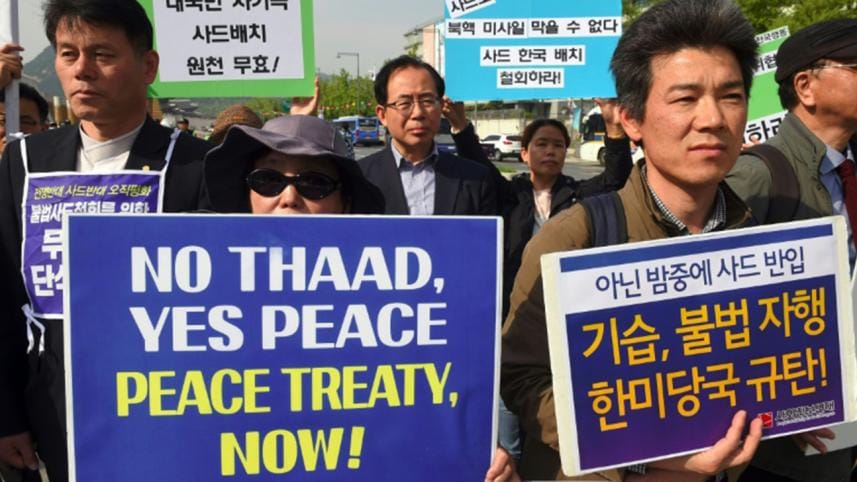China demands halt to US missile shield in SKorea

China demanded on Tuesday an immediate halt to a controversial US missile shield hours after Washington announced that the defence system was now operational in South Korea.
Washington and Seoul agreed to the Terminal High Altitude Area Defense (THAAD) battery deployment in July in the wake of a string of North Korean missile tests.
But its deployment has infuriated China, which fears it will weaken its own ballistic missile capabilities and says it upsets the regional security balance.
"We oppose the deployment of the THAAD system in (South Korea) and urge relevant sides to immediately stop the deployment. We will firmly take necessary measures to uphold our interests," foreign ministry spokesman Geng Shuang said at a regular press briefing.
While Beijing lashed out at the shield's deployment, the foreign ministry expressed support for US President Donald Trump's surprise comments that he would be "honored" to meet North Korean leader Kim Jong-Un under the right conditions.
"If it would be appropriate for me to meet with him I would, absolutely. I would be honored to do it," Trump said in an interview with Bloomberg.
Asked about Trump's remarks, Geng said that China "has always believed that dialogue and consultation... is the only realistic and viable way to achieve denuclearisation."
"We also said many times that the US and DPRK... should make political decisions at an early date, take action and show good faith so that we can create a better atmosphere for resuming the peace talks and settling the issue," he added.
Economic backlash
Earlier, US Forces Korea said THAAD is "operational and has the ability to intercept North Korean missiles and defend the Republic."
A US defence official told AFP, however, that the system has only "reached initial intercept capability".
This initial capability will be augmented later this year as additional hardware and components arrive to complete the system, officials said.
The THAAD system, which is being installed on a former golf course in the southern county of Seongju, is designed to intercept and destroy short- and medium-range ballistic missiles during their final phase of flight.
Beijing has imposed a host of measures seen as economic retaliation against the South for the THAAD deployment, including a ban on tour groups.
Retail conglomerate Lotte, which previously owned the golf course, has also been targeted, with 85 of its 99 stores in China shut down, while South Korea's biggest automaker Hyundai Motor has said its Chinese sales have fallen sharply.
The THAAD deployment comes as tension soars on the Korean peninsula following a series of missile launches by the North and warnings from the administration of US President Donald Trump that military action is an "option on the table."
Who should pay?
Further complicating matters, Trump stunned Seoul last week when he suggested South Korea should pay for the $1 billion THAAD system.
"I informed South Korea it would be appropriate if they paid. It's a billion-dollar system," Trump was quoted as saying in a published report.
"It's phenomenal, shoots missiles right out of the sky."
Seoul retorted that under the Status of Forces Agreement that governs the US military presence in the country, the South would provide the THAAD site and infrastructure while the US would pay to deploy and operate it.
Thomas Karako, the director of the Missile Defense Project at the Center for Strategic and International Studies, noted that South Korea's sole THAAD battery does not quite have the range to cover the entire country.
But he called it an important first step.
"This is not about a having a perfect shield, this is about buying time and thereby contributing to the overall credibility of deterrence," Karako told AFP.
"South Korea with THAAD helps communicate to the North that today is not a good day to attack. It doesn't mean that they could not do a lot of damage -- they would -- but it strengthens the overall posture."
 For all latest news, follow The Daily Star's Google News channel.
For all latest news, follow The Daily Star's Google News channel.
Comments